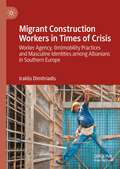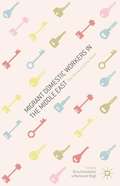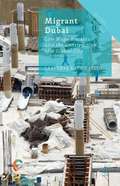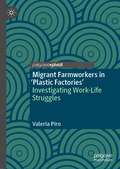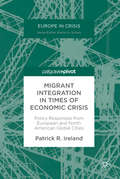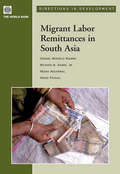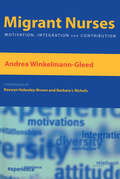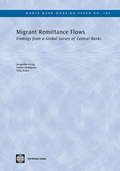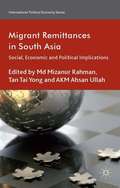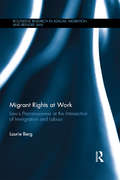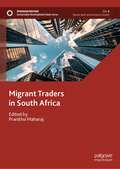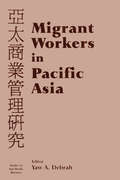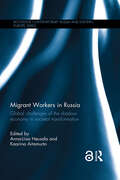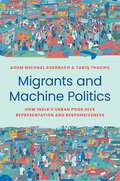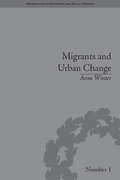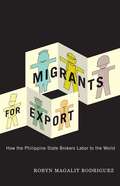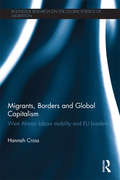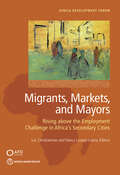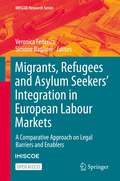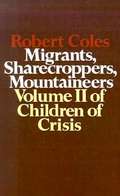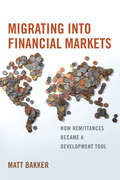- Table View
- List View
Migrant Construction Workers in Times of Crisis: Worker Agency, (Im)mobility Practices and Masculine Identities among Albanians in Southern Europe
by Iraklis DimitriadisThis book explores how migrant construction workers in Southern Europe faced unemployment and precarious work conditions during and after the Great Recession. By drawing on rich qualitative data, it investigates the experiences of Albanian men within and beyond the workplace, and sheds light on the capacity of migrant builders to deal with economic hardships and the role of their families and masculine identities in shaping their coping practices. This book suggests a new framework for the study of coping practices among migrant (construction) workers, and adds to the study of integration processes in Southern European countries by comparing the narratives of settled migrants in Italy and Greece. This book also looks at the effects of the COVID-19 pandemic on migrant builders’ lives in Southern Europe. By adopting an interdisciplinary approach, this book is of interest both to students and researchers in the field of migration studies and those working in the fields of sociology, geography, anthropology, political science and economics.
Migrant Domestic Workers in the Middle East
by Bina Fernandez Marina De RegtFor over half a century, the Middle East - and the Arabian Peninsula in particular - has been major migration corridor for domestic workers from Asia and Africa. Migrant domestic workers comprise a significant proportion of the migrant labour force in these countries, in some cases, nearly fifty per cent. This volume goes beyond a discussion of the working conditions of migrant domestic workers to show the multidimensionality of their lives in the Middle East. The chapters illustrate thesewomen's varied processes of "making a home in the world," the existential transformations they undergo, and the multiple ways in which they are able to exert agency, despite the constrained choices they are often forced to make. Contributors show how the spaces these women occupy disrupt and challenge given notions of the public-private divide, re-working them as spaces of encounter and of relationships of belonging, spiritual connection, friendship, conviviality, and sociality. This volume presents a vibrant portrait of migrant domestic workers in the Middle East as more than passive victims of abuse and exploitation, showing how they (like people everywhere) are actively engaged in finding a balance between acting and being acted upon, between struggle and accommodation, closure and openness, and movement and stasis.
Migrant Dubai: Low Wage Workers and the Construction of a Global City (Global Diversities)
by Laavanya KathiraveluMigrant Dubai.
Migrant Farmworkers in 'Plastic Factories’: Investigating Work-Life Struggles
by Valeria PiroThis book provides a fine-grained ethnographic examination of the everyday negotiations and conflicts taking place in greenhouses and packinghouses in an agricultural district in south-eastern Italy (Sicily). In a highly competitive global scenario, driven by multinational corporations and large retailers, small and medium-sized farms largely rely on migrant labour to fill their demand for casualized, flexible and low-paid jobs. By taking the reader into the ‘plastic factories’ where the author was hired as a farmworker, this book sheds light on the struggles – around the employment contract, the wage and the body – which take place every day between employers and employees. The book contributes to broadening the understanding of the dynamics innervating food production worldwide by recognizing the pivotal role of migrant labour not only as a factor in the restructuring of global supply chains, but also as an actor shaping these processes through its own unpredictable strategies.
Migrant Farmworkers in the Midwest (A)
by Michael Kennedy Ray A. GoldbergIndustry and Background Note
Migrant Farmworkers in the Midwest (A)
by Michael Kennedy Ray A. GoldbergDescribes the background to the recent agreement between Campbell Soup Co. growers and Farm Labor Organizing Committee (FLOC) settling a seven year dispute and boycott. This agreement serves as a possible model for resolving farm labor disputes and may provide a basis for legislation to regulate the two and a half million farmworkers in the United States.
Migrant Farmworkers in the Midwest (B)
by Ray A. Goldberg David M. TheobaldUpdate on the organized migrant farm worker in Ohio working with the tomatoe and cucumber growers and companies such as H.J. Heinz and Dean Foods.
Migrant Integration in Times of Economic Crisis
by Patrick R. IrelandThis book examines how the severe economic downturn following the 2007-2008 financial crisis affected the structural integration and quality of life of urban migrants in Europe and North America. It compares the experiences of migrants from Poland, Romania, Serbia, Pakistan, and Ghana in five similar, secondary global cities of Hamburg (Germany), Barcelona (Spain), Chicago (USA), Toronto (Ontario, Canada), and Montr#65533;al (Qu#65533;bec, Canada) over the period of 2000-2015. The work uses statistical analysis to gauge changes in residential segregation and structural integration (such as unemployment, poverty, and social assistance rates). It then provides qualitative analyses of individual city neighborhoods where the target migrant groups have settled, exploring each community's unique evolution and the ambivalent impact that local policy responses have had on their quality of life. With this study, researchers, instructors, students, and policymakers with an interest in migration, urban development, and global cities will be far more knowledgeable of both the potential and limits of policy efforts.
Migrant Labor Remittances in South Asia
by Richard Adams Nikos Passas Reena Aggarwal Samuel Munzele MaimboAccording to a recent World Bank study of remittances, Bangladesh, India, Pakistan and Sri Lanka are all among the top 20 receivers of remittances, with estimated receipts of US$3.2 billion, US$8.4 billion and US$1.5 billion respectively. 'Migrant Labor Remittances in South Asia' identifies and discusses the key issues affecting the remittance industry in South Asia. It examines the development and implementation of policies, processes, and infrastructure to foster a development-oriented transfer of financial resources between migrants in developed economies and their families in the region. Rather than duplicate previous remittances work, this title only focuses on the region?s distinguishing characteristics, namely: --A large migrant population of semi-skilled and unskilled workers largely concentrated in the Arabian Gulf countries, particularly Saudi Arabia and the United Arab Emirates. --The presence of dedicated public institutions and government financial incentives aimed at facilitating and providing incentives for temporary migration and remittance inflows --The existence of large state bank branch networks with immense potential for a more effective and efficient remittance financial market. --The widespread usage of trade related informal remittance channels by both legal and illegal migrants. The book is intended for policymakers who legislate and regulate the financial sector, as well as for researchers and providers of remittance services.
Migrant Nurses: Motivation, Integration and Contribution
by Andrea Winkelmann-Gleed Roswyn Hakesley-Brown Karen AtkinThe NHS and independent healthcare sectors increasingly depend on the contributions of the migrant workforce to make up for serious shortfalls in staff numbers. This book analyses the motivation required for nurses to migrate, their experience of integration and the important contribution they can make in the healthcare environment. Based on quantitative and qualitative research conducted among migrant and refugee nurses, this book includes many first-hand accounts from individuals adapting to working life in the United Kingdom. It covers areas such as diversity, relationships, problems, cultural understanding and exclusion, as well as taking an overall look at migration, ethnicity and employment. "Migrant Nurses" is a practical handbook that provides vital information for human resources managers in the NHS and private healthcare sectors, diversity managers and mentors. It provides great insight for researchers interested in organisational behaviour, healthcare and development studies. Policy makers and shapers will find it helpful and community groups working with migrants and refugees will also find it valuable.
Migrant Remittance Flows: Findings from a Global Survey of Central Banks
by Dilip Ratha Jacqueline Irving Sanket MohapatraDrawing on the findings from responses to a survey conducted in 2008-09 from 114 central banks worldwide (of which 33 are in Africa), this paper aims to better understand how central banks and other national institutions regulate and collect data and other information on cross-border remittance flows. Findings indicate that, although the vast majority of countries, in both sending and receiving countries, collect data on remittances, and 43 percent of receiving countries estimate informal remittances, there is a need for more frequent and better coordinated data collection, both across national institutions and among different divisions within the same national institution, as well as between countries. Survey results also indicate that many new market entrants' transfer activities are unregulated. Countries must take into account new channels and technologies, such as mobile phone service providers, in monitoring remittance flows. It will be important for national regulatory authorities to work closely with mobile telecoms network operators to strike the right regulatory balance, to better understand these new channels' associated risks and fully tap their potential for fostering inexpensive, efficient remittance transfer services. The high cost of transfers was cited in the survey as the top factor inhibiting migrants from using formal channels. Many countries, particularly in Africa, have made progress in rendering exclusivity contracts illegal, which helps increase competitiveness and reduce transfer costs. But further policy reforms and initiatives are needed to address the high costs of remittances. The joint African Development Bank-World Bank Africa Migration Project and G-8 Global Remittances Working Group provided partial funding support for this study.
Migrant Remittances in South Asia: Social, Economic and Political Implications (International Political Economy Series)
by Md Mizanur RahmanThis volume provides theoretical treatments of remittance on how its development potential is translated into reality. The authors meticulously delve into diverse mechanisms through which migrant communities remit, investigating how recipients engage in the development process in South Asia.
Migrant Rights at Work: Law's precariousness at the intersection of immigration and labour (Routledge Research in Asylum, Migration and Refugee Law)
by Laurie BergPublic debates about the terms of membership and inclusion have intensified as developed economies increasingly rely on temporary migrant labour. While most agree that temporary migrant workers are entitled to the general protection of employment laws, temporary migrants have, by definition, restricted rights to residence, full social protections and often to occupational and geographic mobility. This book raises important ethical questions about the differential treatment of temporary and unauthorised migrant workers, and permanent residents, and where the line should be drawn between exploitation and legitimate employment. Taking the regulatory reforms of Australia as a key case study, Laurie Berg explores how the influence of immigration law extends beyond its functions in regulating admission to and exclusion from a country. Berg examines the ways in which immigration law and enforcement reconfigure the relationships between migrant workers and employers, producing uncertain and coercive working conditions. In presenting an analytical approach to issues of temporary labour migration, the book develops a unique theoretical framework, contending that the concept of precariousness is a more fruitful way than equality or vulnerability to evaluate and address issues of temporary migrant labour. The book will be of great interest to scholars and practitioners of immigration law and employment law and policy.
Migrant Traders in South Africa (Sustainable Development Goals Series)
by Pranitha MaharajThis edited book examines the social realities of migrant traders in the informal economy in South Africa. It draws on original research conducted with migrant traders in order to understand their lived experiences in light of the COVID-19 pandemic. With chapters on the diverse types of informal trading, urban versus rural settings, migrant women, xenophobia, crime, poverty, well-being and policy responses, the book will be a valuable resource for researchers, scholars, policymakers and development practitioners whose work relates to SDG 8 (Decent Work and Economic Growth).
Migrant Workers in Pacific Asia
by Yaw A. DebrahThe migration of workers to the high growth countries in Pacific Asia in the 1980s was a new phenomenon in these countries. As such the host governments did not have in place adequate housing, social security and legal protection, but the tight controls following the financial crisis have pushed these issues to the back burner.This volume discusses the debates and controversies surrounding this issue in Malaysia, Taiwan, SIngapore, South Korea, Japan and China.
Migrant Workers in Russia: Global Challenges of the Shadow Economy in Societal Transformation (Routledge Contemporary Russia and Eastern Europe Series)
by Kaarina Aitamurto Anna-Liisa HeusalaRussia has a very large pool of economic migrants, up to 25% of the workforce according to some estimates. Although many migrants, many from former Soviet countries which are now independent, entered Russia legally, they frequently face bureaucratic obstacles to legal employment and Russian citizenship, factors which have led to a very large “shadow economy”. This book presents a comprehensive examination of migrant labour in Russia. It describes the nature of migrant labour, explores the shadow economy and its unfortunate consequences, and discusses the rise of popular sentiment against migrants and the likely impact. The book also sets the Russian experiences of migrant labour in context, comparing the situation in Russia with that in other countries with significant migrant labour workforces.
Migrante: Using Tech to Provide Financial Inclusion to Immigrants
by Boris Vallee Mauricio LarrainCase
Migrants and Machine Politics: How India's Urban Poor Seek Representation and Responsiveness
by Tariq Thachil Adam Michael AuerbachHow poor migrants shape city politics during urbanizationAs the Global South rapidly urbanizes, millions of people have migrated from the countryside to urban slums, which now house one billion people worldwide. The transformative potential of urbanization hinges on whether and how poor migrants are integrated into city politics. Popular and scholarly accounts paint migrant slums as exhausted by dispossession, subdued by local dons, bought off by wily politicians, or polarized by ethnic appeals. Migrants and Machine Politics shows how slum residents in India routinely defy such portrayals, actively constructing and wielding political machine networks to demand important, albeit imperfect, representation and responsiveness within the country’s expanding cities.Drawing on years of pioneering fieldwork in India’s slums, including ethnographic observation, interviews, surveys, and experiments, Adam Michael Auerbach and Tariq Thachil reveal how migrants harness forces of political competition—as residents, voters, community leaders, and party workers—to sow unexpected seeds of accountability within city politics. This multifaceted agency provokes new questions about how political networks form during urbanization. In answering these questions, this book overturns longstanding assumptions about how political machines exploit the urban poor to stifle competition, foster ethnic favoritism, and entrench vote buying.By documenting how poor migrants actively shape urban politics in counterintuitive ways, Migrants and Machine Politics sheds new light on the political consequences of urbanization across India and the Global South.
Migrants and Urban Change: Newcomers to Antwerp, 1760-1860 (Perspectives in Economic and Social History #1)
by Anne WinterTaking the Belgian city of Antwerp as a case-study, this book argues that the direction of nineteenth century societal change was such as to make some groups of people better suited to reap the benefits of new opportunities.
Migrants for Export
by Robyn Magalit RodriguezMigrant workers from the Philippines are ubiquitous to global capitalism, with nearly 10 percent of the population employed in almost two hundred countries. In a visit to the United States in 2003, Philippine president Gloria Macapagal Arroyo even referred to herself as not only the head of state but also "the CEO of a global Philippine enterprise of eight million Filipinos who live and work abroad. " Robyn Magalit Rodriguez investigates how and why the Philippine government transformed itself into what she calls a labor brokerage state, which actively prepares, mobilizes, and regulates its citizens for migrant work abroad. Filipino men and women fill a range of jobs around the globe, including domestic work, construction, and engineering, and they have even worked in the Middle East to support U. S. military operations. At the same time, the state redefines nationalism to normalize its citizens to migration while fostering their ties to the Philippines. Those who leave the country to work and send their wages to their families at home are treated as new national heroes. Drawing on ethnographic research of the Philippine government's migration bureaucracy, interviews, and archival work, Rodriguez presents a new analysis of neoliberal globalization and its consequences for nation-state formation.
Migrants, Borders and Global Capitalism: West African Labour Mobility and EU Borders
by Hannah CrossPeople from West Africa are risking their lives and surrendering their citizenship rights to enter exploitative labour markets in Europe. This book offers an explanation for this phenomenon that is based on close analysis of the contradictory economic and political agendas that create and constrain labour migration. It shows how global capitalism regulates different stages of the process within an interconnected system of economic dispossession, the construction of an illegal status, border control, labour exploitation and processes of underdevelopment. This is summarised as a regime of ‘unfree labour mobility’. Combined with structural and historical approaches, this book is based on ethnographic research. It incorporates those who are left behind, those who decide to stay, migrants who fail and those who are on the move, alongside clustered migrant communities in Senegal, Mauritania and Spain. The book’s panoramic approach shows how West African ‘step-wise’ journeys to Europe by land and sea sees competing territorial and economic policies regulating an unstable and unpredictable trajectory, creating ‘illegal’ labour through dual logics of border security and selective labour mobility. This book demonstrates that the diverse channels through which people migrate in the modern era are mediated by European states and labour markets, which utilise border regimes to control labour and be globally competitive. The themes and patterns that emerge, in their context of inter-generational change, present a challenge to the accepted wisdom about the individual and household dynamics of labour migration. This book is of interest to students and scholars of migration, transnationalism, politics, security, development, economics, and sociology.
Migrants, Markets, and Mayors: Rising above the Employment Challenge in Africa's Secondary Cities (Africa Development Forum)
by Luc Christiaensen and Nancy Lozano-GraciaResearch on migration and urban development in Africa has primarily focused on larger cities and rural-to-urban migration. However, 97 percent of Africa’s urban centers have fewer than 300,000 inhabitants, and a sizable share of urban migrants come from other urban areas. A more holistic and dynamic perspective, incorporating migration flows along the full urban hierarchy, as well as urban-urban migrants, is needed to better understand and leverage migration for urban development. Migrants, Markets, and Mayors: Rising above the Employment Challenge in Africa’s Secondary Cities draws on demographic data, research literature, key informant interviews, and empirical research to better understand how migrants in Africa’s secondary cities fare in urban labor markets, how they affect aggregate urban productivity, and how mayors can leverage migrants’ potential to the benefit of all. It explores these questions across countries and four urban case settings: Jijiga in Ethiopia, Jinja in Uganda, and Jendouba and Kairouan in Tunisia. Although mayors in secondary cities often see migrants as a burden to their cities’ labor markets and a threat to development, the report finds that migrants contribute increasingly less to urban population growth and that they usually strengthen the resident labor force. The report also finds that labor market outcomes for migrants are at least as good as those for nonmigrants. Africa’s secondary cities are well placed to leverage migration, but evidence-based policies are needed to manage the growth and development of land and labor markets. The report reviews policy options that mayors can take to strengthen the financial, technical, and planning capacity of secondary cities and better leverage migration to benefit migrants and nonmigrants alike. ----------- "Much of the literature on migration to cities examines migration in a nonspatial fashion or focuses on rural-urban migration to the largest, most visible cities. This volume fills a gap by focusing on migration to secondary cities, coming up with a compelling set of facts. Overall, the volume is very well done and sets a benchmark for future research." †“ J. Vernon Henderson, School Professor of Economic Geography, London School of Economics
Migrants, Refugees and Asylum Seekers’ Integration in European Labour Markets: A Comparative Approach on Legal Barriers and Enablers (IMISCOE Research Series)
by Simone Baglioni Veronica FedericoThis open access book discusses how, and to what extent, the legal and institutional regimes and the socio-cultural environments of a range of European countries (the Czech Republic, Denmark, Finland, Greece, Italy, Switzerland and the UK), in the framework of EU laws and policies, have a beneficial or negative impact on the effective capacity of these countries to integrate migrants, refugees and asylum seekers into their labour markets. The analysis builds on the understanding of socio-cultural, institutional and legal factors as “barriers” or “enablers”; elements that may facilitate or obstruct the integration processes. The book examines the two dimensions of integration being access to the labour market (which, translated into a rights language means the right to work) with its corollaries (recognition of qualifications, vocational training, etc.), and non-discriminatory working conditions (which, translated into a rights language means right to both formal and substantial equality) and its corollaries of benefits and duties deriving from joining the labour market. It thereby offers a novel approach to labour market integration and migration/asylum issues given its focus on legal aspects, which includes most recent policy changes and legal decisions (including litigation cases). The robust, evidence-based and comparative research illustrated in the book provides academics and students, but also practitioners and policy makers, with up to date knowledge that will likely impact positively on policy changes needed to better address integration conundrums.
Migrants, Sharecroppers, Mountaineers (Volume 2 of Children of Crisis)
by Robert ColesSince the late 1950's, Robert Coles has been studying, living with, and, above all, listening to the American poor. The result is one of the most vigorous and searching social studies ever undertaken by one man in the United States. Migrants, Sharecroppers, Mountaineers is the second volume in Dr. Coles's award-winning series, Children of Crisis. In it, he listens to three groups: the migrant workers who travel the eastern coast of this country, picking crops day after day; the sharecroppers and tenant farmers who live on isolated southern plantations, just as their ancestors did as slaves; and the mountaineers of Appalachia, whose only choice lies between coal mining and starvation.<P><P> Pulitzer Prize Winner
Migrating into Financial Markets: How Remittances Became a Development Tool
by Matt BakkerA free ebook version of this title is available through Luminos, University of California Press' new open access publishing program for monographs. Visit www.luminosoa.org to learn more. We understand very little about the billions of dollars that flow throughout the world from migrants back to their home countries. In this rigorous and illuminating work, Matt Bakker, an economic sociologist, examines how these migrant remittances--the resources of some of the world's least affluent people--have come to be seen in recent years as a fundamental contributor to development in the migrant-sending states of the Global South. This book analyzes how the connection between remittances and development was forged through the concrete political and intellectual practices of policy entrepreneurs within a variety of institutional settings, from national government agencies and international development organizations to nongovernmental policy foundations and think tanks.
